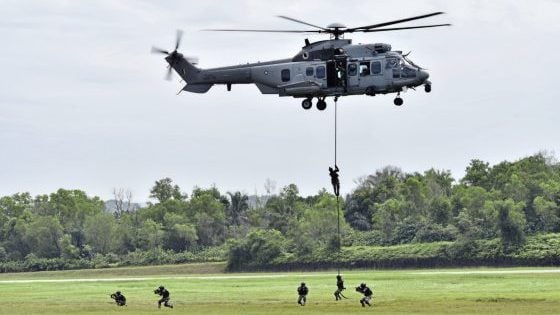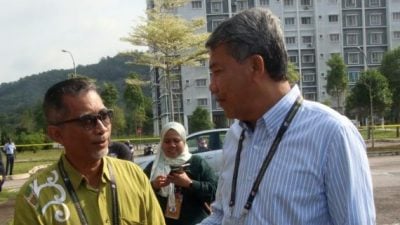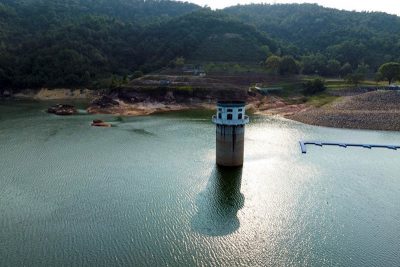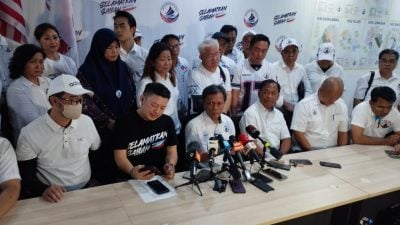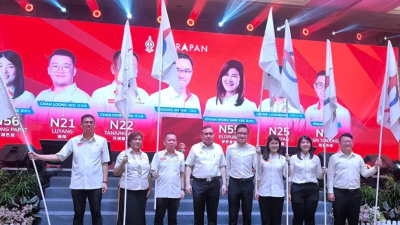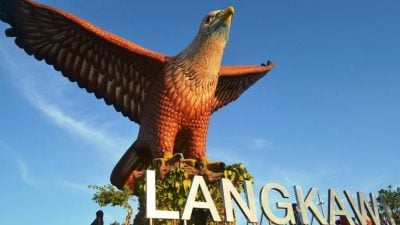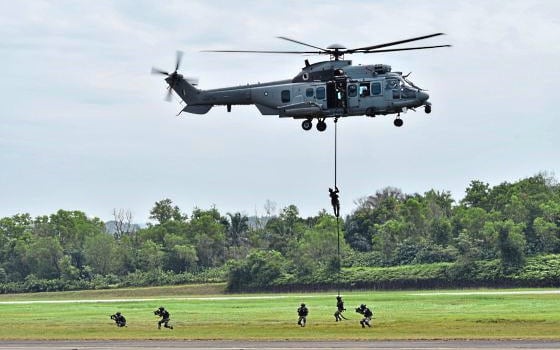
The history of Royal Malaysian Air Force Special Forces (PASKAU) could be traced back to the 1970s.
Before it became a special forces unit, it was known as HANDAU (Pasukan Pertahanan Darat dan Udara, or the Ground and Air Defence Unit) responsible for the safety of TUDM’s (Royal Malaysian Air Force) air bases.
In 1996, the TUDM restructuring saw the remodelling of HANDAU into a special forces unit (PKU) with a new responsibility of fighting terrorism, and responding to threats and clashes to ensure the safety of the nation.
Since 2002, this PKU has been known as PASKAU.
“What prompted you to want to become a PASKAU member?”
Brigadier-General Meor Ahmad Kamal Meor Termizi TUDM, who has served in the Air Force for 39 years, replied with a touch of humour, “Actually since young I never actually thought of joining the armed forces.”
His father was a member of the Royal Malay Regiment during its early years.
When Meor Ahmad Kamal was in Standard 3, his father retired from the army.
“My dad loved to share with me his experiences in the army when I was young. For instance, he told me he was among the first Malaysian soldiers to join the peacekeeping mission in Congo.”
After finishing Form 5, Meor Ahmad Kamal got admitted into UiTM to pursue a course in civil engineering. At the end of the first semester, by chance he came across an armed forces recruitment advertisement on TV. Probably due to the influence by his father in his daily living, he sent in his application form without the slightest hesitation.
A PASKAU member may not get to fly a jet
Initially he was thinking of becoming a TUDM pilot.
“After I was promoted to Major, I registered myself for a 3-month basic PASKAU commando course at Bukit Jugra in Kuala Langat district.
“At the end of the course, only the participants conferred with the blue berets could officially become PASKAU members.”
Moreover, after the basic course, each participant would have to join additional specialised courses such as close-quarters battle, intelligence, anti-terrorism, hostage rescue, etc.
So, does a PASKAU member always get to fly a fighter jet? Not necessarily, Meor Ahmad Kamal said.
While many yearn to fly a fighter jet, becoming a pilot is by no means easy, as you have to pass various examinations and validation tests.
“You need to be physically and mentally strong. Only the best among the best get to fly a fighter jet!”
You will at least need to be an officer first before you can become a pilot.
Meor Ahmad Kamal advised young people to pursue their studies at the National Defence University of Malaysia or Universiti Pertahanan Nasional Malaysia (UPNM), and become a sub-lieutenant upon graduation. In this way they can fulfil the minimum requirement to be a pilot.
After passing the TUDM evaluation tests and examinations, they will then be sent to the Royal Air Force Academy in Alor Setar to receive one year of pilot training.
“You will learn all the flight techniques and skills during this one year. After that, you will be sent to different departments based on your capabilities.
“You may fly an helicopter, a transport aircraft or a fighter jet. Knowing how to fly an helicopter or a transport aircraft does not mean you can fly a fighter jet, too. This is because each aircraft model has different ways of operation.”
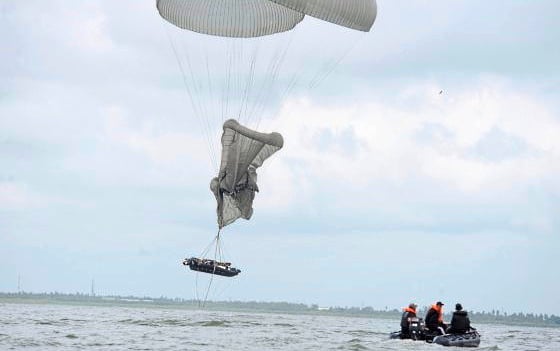
60% elimination rate for basic commando training
To qualify as a PASKAU member, you will need to have a strong resolution and determination, and the most difficult and challenging part is the 3-month basic commando training.
How tough is the training?
Meor Ahmad Kamal cited the jungle training as example.
Due to the vast rainforest coverage of the country, all armed forces personnel, including the army, navy or air force, must command jungle fighting skills.
During the training, each participant will have to carry a weight of 10kg and walk 160 kilometers inside the jungle.
This is followed by swamp survival training in which no knives will be provided and the participants will improvise their weapons from whatsoever materials they can source in the swamp, to catch fish or other animals.
They will also have to undergo a “dark water” shooting and assault training. They will be made to paddle their boats for 160 kilometers in total darkness and destroy the enemy camp.
Not everyone can pass the basic commando tests and the elimination rate could be as high as 60%!
Meor Ahmad Kamal recalled that only 63 out of 198 in his semester passed the tests, meaning 68% of trainees were eliminated!
Carrying out missions on land and sea
In addition to aviation threats, PASKAU is also involved in sea and land security missions. There are four squadrons carrying out the battle missions.
Special Force Protection has been tasked with ensuring the safety of air bases; Special Air Combat Assault (SACA) is carrying out air battle missions, while Maritime Para Rescue (MPR) and Combat Air Rescue (CAR) will carry out rescue missions.
“PASKAU will be mobilised as soon as possible whenever there is a need from our military aircraft.
“If a military aircraft is crashed, PASKAU will have to respond instantly and rush to the site as soon as possible to rescue the crew as well as confidential documents in it.
“PASKAU also has the capability of saving our soldier and citizens from the enemies.”
Meor Ahmad Kamal explained that MPR works around the clock and will act immediately in the event of any emergency.
TUDM will dispatch C-130 “Hercules” transporter to ferry MPR personnel along with a rigid-hulled inflatable boat (RHIB) which will be lowered with a parachute when the aircraft is nearing the site of incident, and the MPR personnel will jump down from the aircraft cabin in parachutes and then board the RHIB.
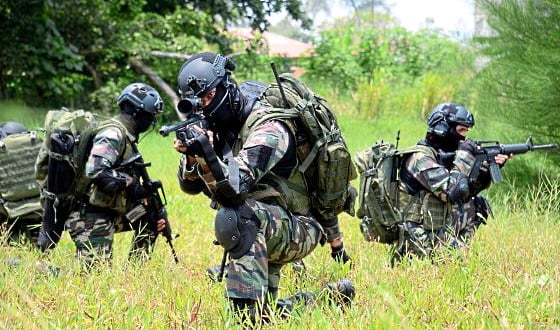
The unforgettable Genting Sempah incident
Meor Ahmad Kamal said his most unforgettable rescue mission was during the Genting Sempah incident, when a military aircraft crashed into the jungle.
Various rescue teams were mobilised at that time, including 10 Briged Para, VAT 69, Rejimen ke-22 Gerak Khas, Senoi Praaq, Pasukan Gerakan Am PDRM, etc.
“90% of PASKAU personnel taking part in the search and rescue operation were from the Combat Air Rescue unit.”
The rescue teams took five days to locate the debris of the crashed aircraft and bodies of the crew.
According to Meor Ahmad Kamal, the mishap took place in a virgin jungle near Genting Sempah during the rainy season. It was extremely challenging for the search and rescue operation because of the thick foliage and hilly terrain.
The hills were like huge walls and all the rescue personnel had to either scale the hills or navigate around them yet make sure they were moving in the right direction towards the crash site.
“The mature tree canopy concealed the view on the ground from the helicopter.”
They had no choice but to tread on foot inside the forest.
The forest was divided into several search zones and everyone was doing his utmost to try to locate the doomed aircraft within the shortest time possible.
Unfortunately, all onboard the doomed aircraft were killed.
PASKAU was also missioned to search for the missing Malaysia Airlines flight MH370.
TUDM deployed the C-130 to look for any hint of debris along the original route of MH370.
“If we managed to locate any survivor, we would send CAR personnel to go down to the sea, but unfortunately no survivors had been spotted.
Sulu incursion
The biggest military operation in the country’s history was none other than during the 2013 Lahad Datu standoff at Kampung Tanduo.
Meor Ahmad Kamal said he had the opportunity to join Ops Daulat in Lahad Datu to fight the Sulu terrorists from southern Philippines.
He recalled that after being tipped about the intruders, PASKAU instantly dispatched two elite squads to work with GGK and PASKAL.
PASKAU was responsible for collecting information and identifying the exact location of the terrorists. The information would then be submitted to the police to carry out battle operation.
TUDM also sent fighter jets to bomb the hostile camp in a bid to end the standoff soon.
Ground laser target designator (GLTD) was employed by the SACA unit from PASKAU to mark the enemy site to facilitate bombing from air.
It was reported that TUDM deployed three units of F-18 fighter jets and five units of Hawk fighter jets on March 5, 2013 to bomb the Sahabat Felda settlement near Lahad Datu. They managed to kill more than ten terrorists.
In less than a week, the armed forces successfully destroyed the Sulu army and restored peace to Sabah.
Having served in the Air Force for so many years, Meor Ahmad Kamal hoped more young Malaysians would apply to join PASKAU, in particular the Chinese.
“We want more young non-Malays to join us, especially the Chinese,” he said.
Read also:
GGK: shouldering the responsibility of the nation’s peace
PASKAL, the heroes fighting maritime terrorism
ADVERTISEMENT
ADVERTISEMENT








